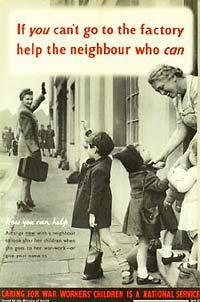 Most of us will have heard from our parents or grandparents of a time when your front door was always open, your neighbours were your best friends on earth, and your local community was like a huge extended family. Flash-forward to 2013: how many of us can honestly say we invest time and energy into our community? Are we even on speaking terms with our neighbours? The benefits of feeling like part of your local community are numerous, but to reap them, first you must sow.
Most of us will have heard from our parents or grandparents of a time when your front door was always open, your neighbours were your best friends on earth, and your local community was like a huge extended family. Flash-forward to 2013: how many of us can honestly say we invest time and energy into our community? Are we even on speaking terms with our neighbours? The benefits of feeling like part of your local community are numerous, but to reap them, first you must sow.
Sowing the Community Seed
Working longer hours, using weekends and evenings to get jobs around the house completed, and the age of gawping at our computers and smartphones during our precious leisure time have all contributed to closing the door on our local community. So with this in mind, how can you channel 21st century living habits into giving back to your community? America seems to have a possible answer in the form of new social media platform, Nextdoor.com. The site aims to connect individuals within their own communities online through forums on issues affecting the local area. In addition to this, members can set up rotas for projects, organise babysitting services, sell their old car to a neighbour and much, much more. Whilst this isn’t available in the UK yet, we could see the old fashioned community spirit resurging through this online solution in the future.
In order to take a step towards strengthening a community, one highly effective way is to suss out who wants and needs locals to get behind them and their ideas. Schools are a fantastic place to start. An education charity will often be the driving force of important school projects that look to instil a sense of community within students, and may well be looking for local individuals and businesses to support a cause. Giving up a little of your time to assist a school-based project, such as creating a safe outside space within school grounds or helping to organise a fund-raiser, will be a positive step in building a strong community.
Do We Really Need Community Spirit?
Listening to accounts of what life was like in Britain during World War II quickly demonstrate just how important a close community is to all its residents. For many, having the community to rally around them became the very thing that got them through the darkest of days. This spirit kept the nation going, and whilst we may not be at war now, we have certainly experienced tough times over the past few years.
If you knocked on 10 doors along your street, the likelihood of finding a struggling family behind one of those doors is incredibly high. With redundancies being made left, right and centre, do you know how members of your own community are coping in light of losing their livelihood? And vice versa: if you found yourself in a less than desirable situation, would the community know to reach out to you?
If this spirit is gone for good and we keep ourselves to ourselves, connections will never be established and we will miss out on the opportunity to make a difference to an individual or group who would truly benefit from our relationship with them. What’s more, we will miss out on the chance to accept community support if we ever needed it in our hour of need.
Reaping the Benefits of a Close-Knit Community
As an individual or family, you can reap the benefits of community involvement in many ways, including having a voice of authority in matters that stand to affect you, knowing trusted people and businesses you can turn to when you need a helping hand, gaining a deeper knowledge of your local area, and creating a safer environment for your children.
Businesses also stand to benefit from giving back to the area they operate in; not only does it get their name out into the community, it stands to strengthen their brand through displaying corporate social responsibility above and beyond handing out a cheque to a charity each Christmas in the hope of a bit of local press coverage.
Is community spirit dead and gone? It doesn’t have to be. Take the first step by finding out if and when a community meeting has been set up. If there isn’t a meeting already scheduled, then make it your responsibility to set one up! Accepting or extending the local olive branch can lead to amazing relationships being formed reminiscent of war time morale; something we could all stand to benefit from in this difficult climate.
Photo Credits
Photo Courtesy Of The University Of Nottingham
Guest Author Bio
Sophie Baker-Britton
 Sophie specialises in writing about charitable deeds and not-for-profit business. She is the creator of ethical issues website Greenkind and has recently started attending her local community meetings in a bid to find and embrace the spirit she heard so much about from her Grandparents.
Sophie specialises in writing about charitable deeds and not-for-profit business. She is the creator of ethical issues website Greenkind and has recently started attending her local community meetings in a bid to find and embrace the spirit she heard so much about from her Grandparents.
Blog / Website: http://www.greenkind.co.uk/
Recent Guest Author Articles:
- How Strong Business Training Translates Into Everyday Decision-Making
- New Career and Degree Paths for Educators Who Want to Make a Broader Impact
- Finding the Right Plumber in Portland: A Comprehensive Guide for Homeowners
- Why Choose Elara Caring for Jackson, MI Home Health Services?
- How I Turned Poetry into a Paycheck


Thanks ever so much for your comment Chris, very much appreciated.
Great article and I don’t think community spirit is dead at all, but has shifted a bit due to the increasing pressure of just surviving in a community. The economic pressures facing the middle class with two people having to work full time to make up what one person used to bring in is pretty intense these days and leads to a more focused approach to working within your community. Ie., I think people strategize about how they want to give back and with whom as opposed to wandering their neighborhood. Our global consciousnesses increases our sense of community ito a broader scope, hence we’ll volunteer for Greenpeace or Amnesty International as opposed to the local food bank. And with the advent of electronic communications our sense of community has shifted to Facebook where we can be activists for 30 seconds each day, and yet there are still local community markets, and lots of volunteers around. Our organization is primarily volunteer driven with people who want to give back, who want to help and who care about our local youth and our global youth at the same time.